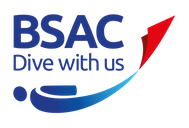Try Dives: Your First Step
It's easy to get started with us. Simply arrange a Try Dive in the Pool and we will introduce the SCUBA equipment to you, give you the chance to breathe underwater and then take you for an underwater tour.
You will need to be able to swim four lengths of the Pool (100m), in your own time using any strokes you prefer before we start the Try Dive session so we know you're a competent swimmer.
You may be surprised to know that little swimming is involved in scuba diving - we use our fins to propel us around.
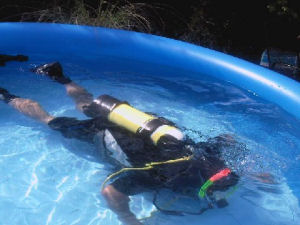
You also need to be at least 12 years of age, and if you are under 18, we will need your parents' consent.
Your Questions Answered
Why do I have to wait until I am 14 to learn to dive?
Diving is quite a technical sport and needs a reasonable level of maturity and physical strength. BSAC (the sport's UK governing body) has decided that most young people are capable of learning to dive safely from the age of 12.
As a club we decided that we would prefer not to take under 14s as trainees for the time being (this policy is reviewed regularly). However, if you are aged between 12 and 14 you can undertake a try dive with AGPSAC.
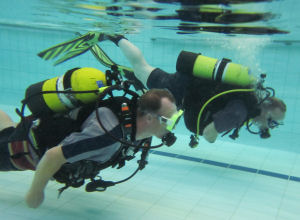
Is there an upper age limit? Am I too old?
No, there is no upper age limit. So long as you are reasonably fit and healthy (you may require a medical certificate see below) you can continue to dive well into your 70s and beyond!
How fit do I need to be?
Diving can be quite strenuous and a reasonable level of fitness is desirable.
However, you do not need to be a super-fit athlete (and most of us aren't!).
The equipment, though heavy, is designed to be comfortable to wear, and there will always be another club member around to assist you with the kitting up.
Once you are in the water, of course, it is nearly weightless.
If you walk, cycle or run, or visit the gym occasionally you should be fine - after that, it's up to you.

Do I need a medical?
Most people complete a self-certification form recommended by the UK Diving Medical Committee.
However, if you answer 'yes' to any of the questions or have a pre-existing medical condition you may need to have a medical. These can be undertaken by recommended medical referee and cost about £75 - £90. Once you have your certificate you are okay to dive for the duration of the certificate (which will vary in length, depending on your condition).
It is a condition of membership that you have an up to date medical certificate and we cannot accept anyone for training or on a trip without one.
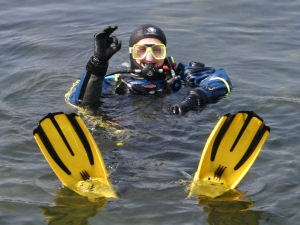
Is it dangerous?
There is an element of risk in many sports and diving is no exception.
Humans do not naturally breathe underwater so we have to carry our breathing gas with us.
The BSAC training enables us to function safely within the underwater world and, so long as we follow that training and dive within our capabilities the risks are minimised.
The keys to all safe diving are training and practice - and we are doing this all the time - even while we are having fun in the water.
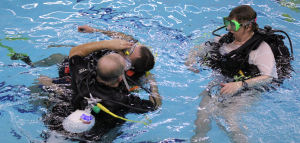
Do I have to buy my own equipment?
The club can provide all the equipment you need for your pool work, it is included in the price of your training.
When it comes to open water training, we can provide all the equipment except thermal protection in the form of a semi-dry or dry suit.
Most of the dive sites we use for training can rent suitable semi-dry suits at reasonable prices, as can a number of the local dive shops.
Once you are convinced that diving is a sport you want to pursue, you can gradually build up your own equipment, having had the opportunity to try a range of equipment and see what works for you.
Once you are qualified, you can continue to rent club kit at a reasonable rate until you have all your own equipment.
Other divers are always pleased to discuss (sometimes at length) their own choice of equipment.
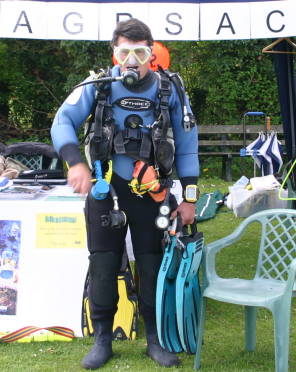
Isn't the sea around the UK cold, dark and empty of life?
It may surprise you to know that the waters around the UK are some of the most productive in the world! It is the cooler temperatures that allow a huge variety of life to flourish. When diving around the UK many divers prefer to wear a drysuit - which is a waterproof suit (sealed at the wrists and neck and with built-in boots), under which you can wear layers of warm clothing. However, it is also possible to dive in the summer in a 5 or 7mm thick wetsuit (and some hardier souls wear these all year round!).
As to being dark: well that depends on the weather... and, at some times of year (usually in the late spring to early summer) plankton blooms can make the water rather murky - BUT AGPSAC members were lucky enough to meet two basking sharks, (the world's second biggest fish) in Cornwall during a plankton bloom, as this is what these majestic animals eat - so, it's "swings and roundabouts" really.
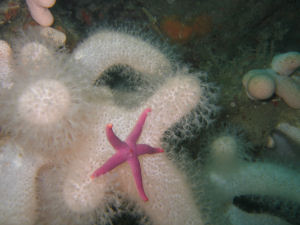
What about sharks?
Well, apart from basking sharks (see above) the type of shark you are most likely to encounter is the dogfish or catshark. This animal grows up to about 1m long and can often be found tucked into a crevice, fast asleep! A few larger animals can occasionally be seen but most sharks prefer to be out in the open ocean and well away from contact with humans.
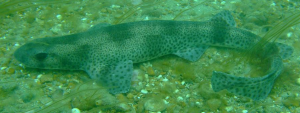
Isn't Aylesbury a rather long way from the sea?
Okay, you got me there, we are about as far from the sea as you can get in England! However, that does mean that we are not tied to going to the same place time after time and in fact, we dive all over the place, mostly on the south to southwest coasts but also in Wales, the northeast and Scotland, as well as occasional trips abroad. We also regularly visit inland sites (usually flooded quarries or gravel pits) for training and early season warm up diving.
When heading off on trips we always try to car-share to make sure that no-one travels alone (unless they choose to) and to share the costs of fuel. For long distance trips, eg to the Isle of Man or Orkney, we may use a van to carry equipment.


